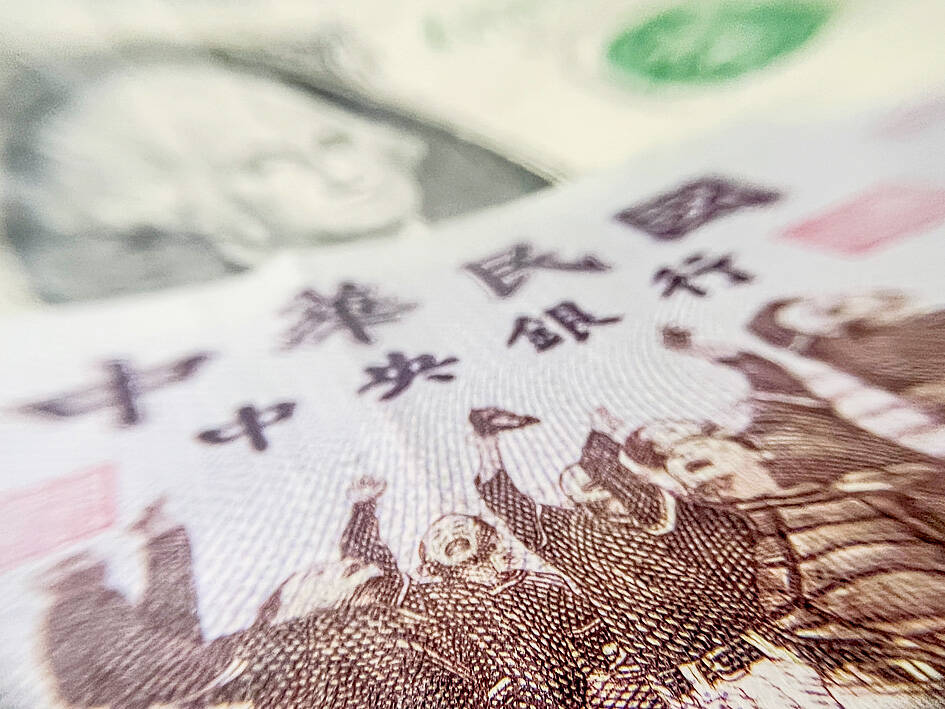Foreign direct investment (FDI) approved by the Investment Commission last year totaled US$11.25 billion, down 15.4 percent from the previous year, but the third-highest since the 2008 global financial crisis.
FDI reached a record US$13.3 billion last year, the highest in 16 years, while the second-highest was in 2018 at US$11.44 billion, the commission said in a report yesterday.
FDI measures the investment activities of foreign firms, including the incorporation of a subsidiary or joint venture, a cash injection into a local unit, or mergers or acquisitions of domestic companies.

Photo: CNA
Despite a setback in FDI last year, foreign companies remain optimistic about Taiwan’s economic prospects, the commission said.
“The average annual FDI was approximately US$10.3 billion from 2016 to 2023, which was much higher than the average of US$5.36 billion from 2008 to 2015, with the top six seen in the past eight years,” the commission said. “This shows that despite the impacts of the COVID-19 pandemic, geopolitical tension and global economic uncertainty, Taiwan is still attractive to foreign investments.”
In particular, investments from New Southbound Policy countries increased 22.45 percent annually to US$2.54 billion, led by Singapore, Thailand and Malaysia, it said.
Taiwan’s FDI excludes investments from China. The commission last year approved US$29.69 million in investments by Chinese firms, a 23.34 percent decrease from a year earlier and marking the lowest since the government lifted a ban on Chinese investments on June 30, 2009, it said.
The commission last year approved a record US$23.58 billion in outbound investments, excluding to China, representing growth of 136.67 percent from the previous year.
That included Taiwan Semiconductor Manufacturing Co’s (台積電) investments of US$8 billion in TSMC Arizona Corp and 3.5 billion euros (US$3.83 billion) in European Semiconductor Manufacturing Co GmbH in Germany; Hon Hai Precision Industry Co’s (鴻海精密) investment of US$800 million in Foxconn Singapore Pte Ltd; and Yang Ming Marine Transport Corp’s (陽明海運) investment of US$800 million on Yang Ming Line (Singapore) Pte Ltd, the commission said.
Outbound investments to China plunged 39.83 percent year-on-year to US$3.04 billion last year, the lowest since 2002, while those to New Southbound Policy countries grew 5.15 percent to US$5.54 billion, which the commission attributed to local firms’ increasing investments in Singapore, Vietnam and Thailand.

When an apartment comes up for rent in Germany’s big cities, hundreds of prospective tenants often queue down the street to view it, but the acute shortage of affordable housing is getting scant attention ahead of today’s snap general election. “Housing is one of the main problems for people, but nobody talks about it, nobody takes it seriously,” said Andreas Ibel, president of Build Europe, an association representing housing developers. Migration and the sluggish economy top the list of voters’ concerns, but analysts say housing policy fails to break through as returns on investment take time to register, making the

NOT TO WORRY: Some people are concerned funds might continue moving out of the country, but the central bank said financial account outflows are not unusual in Taiwan Taiwan’s outbound investments hit a new high last year due to investments made by contract chipmaker Taiwan Semiconductor Manufacturing Co (TSMC, 台積電) and other major manufacturers to boost global expansion, the central bank said on Thursday. The net increase in outbound investments last year reached a record US$21.05 billion, while the net increase in outbound investments by Taiwanese residents reached a record US$31.98 billion, central bank data showed. Chen Fei-wen (陳斐紋), deputy director of the central bank’s Department of Economic Research, said the increase was largely due to TSMC’s efforts to expand production in the US and Japan. Investments by Vanguard International

WARNING SHOT: The US president has threatened to impose 25 percent tariffs on all imported vehicles, and similar or higher duties on pharmaceuticals and semiconductors US President Donald Trump on Wednesday suggested that a trade deal with China was “possible” — a key target in the US leader’s tariffs policy. The US in 2020 had already agreed to “a great trade deal with China” and a new deal was “possible,” Trump said. Trump said he expected Chinese President Xi Jinping (習近平) to visit the US, without giving a timeline for his trip. Trump also said that he was talking to China about TikTok, as the US seeks to broker a sale of the popular app owned by Chinese firm ByteDance Ltd (字節跳動). Trump last week said that he had

STRUGGLING TO SURVIVE: The group is proposing a consortium of investors, with Tesla as the largest backer, and possibly a minority investment by Hon Hai Precision Nissan Motor Co shares jumped after the Financial Times reported that a high-level Japanese group has drawn up plans to seek investment from Elon Musk’s Tesla Inc to aid the struggling automaker. The group believes the electric vehicle (EV) maker is interested in acquiring Nissan’s plants in the US, the newspaper reported, citing people it did not identify. The proposal envisions a consortium of investors, with Tesla as the largest backer, but also includes the possibility of a minority investment by Hon Hai Precision Industry Co (鴻海精密) to prevent a full takeover by the Apple supplier, the report said. The group is